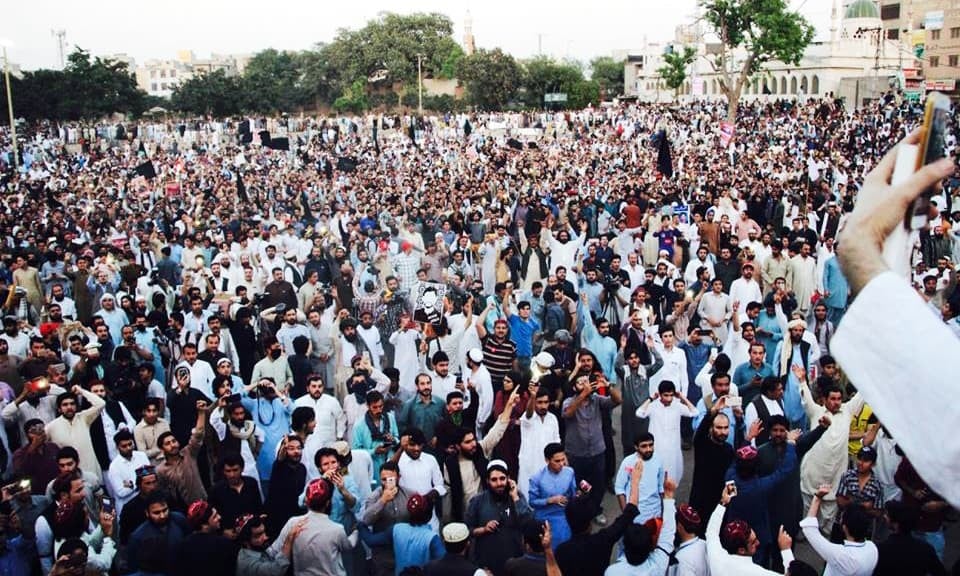
The rise of a peaceful movement has riled the establishment

Dear All,
Ever since its meteoric rise less than a year ago, a movement demanding the protection of the rights of Pakistan’s Pashtuns has generated controversy. The movement took off following the death in Karachi of a young Pashtun named Naqeebullah, who was killed in an alleged "police encounter with terrorists". This incident involved a police officer notorious for such encounters (who is also reputed to get on rather well with the security agencies).
Naqeebullah was a young father, with aspirations to becoming a model or screen star and his social media presence and the fact that he was very photogenic helped generate a tremendous amount of outrage on social media. Civil society activists united in nationwide protests demanding justice for him and action against the police officer, Rao Anwar. Details of the actual incident are murky but one version of events is that the young Pashtun was included in a list of other people who were eliminated upon orders from ‘security agencies’, all under the label of terrorists (reportedly a regular exercise), so it is hardly surprising that even though the police officer was detained, the court ended up absolving him of wrongdoing.
But the movement had touched a raw nerve and a dramatic surge in its support was then witnessed as the stories of a generation of Pashtuns came to the fore.
Mothers and youngsters at subsequent rallies shared stories of lives scarred by missing fathers and brothers, and told tales of living for years trying to deal first with the militants in their areas and then with the military. They recounted that at every stage they were regarded by the authorities with suspicion and loathing.
Although it was reiterated repeatedly that this was a peaceful movement, it was regarded by the State as terrifying. Leaders, activists and supporters of the movement began to be obstructed and harassed. Security officials began to play a game of cat and mouse with the young leader and try to prevent him from reaching the site of any rally, something that social media -- Twitter in particular -- was able to expose. Dirty tricks by local administrations included denying permission for the gatherings or even strewing garbage and flooding the venue with sewer water.
The latter is what was done at the movement’s Lahore rally last year but the organisers used a solid communications network and efficient volunteers to pump the water out and clean the venue. The efficiency with which this was done was documented on social media.
When I interviewed Manzoor Pashteen for the BBC last year, I asked him about where they were getting the money to fund the movement, he explained that they did fundraising at a grass roots level and that the response had been tremendous. He also explained how they used social media extensively to organise. This seemed perfectly feasible to me (not unlike the initial fundraising for Imran Khan’s cancer hospital), but several of my colleagues muttered about their ‘foreign support’ and dramatic rise to prominence.
By ‘foreign support’ they were referring to support from Afghanistan. Although there is no concrete evidence of this, this is exactly the venomous narrative that Pakistan’s establishment now spews about the movement -- that it is made up of traitors and foreign agents. Despite all the restraint shown by supporters at peaceful rallies, security agencies began the systematic harassment of the movement’s activists and leaders. Many were put on the exit control list or detained for weeks and harassed. And on Feb 2, one was killed in a protest in Loralai.
Again the exact sequence of events is not clear but reportedly a police officer targeted a young teacher, Professor Arman Luni and then obstructed his removal to hospital. His death is an important and dangerous moment in Pakistan’s history: the way the media and the nation has reacted to the death of a Pashtun at the hands of a security officials compared with that of a Punjabi (in Sahiwal) has angered Pashtuns and led them to ask: are we not equal citizens?
The venom of the anti-movement narrative, meanwhile, is shocking. Comments on Twitter accuse the movement of killing Arman Luni themselves to both gain political mileage and malign the military. In the wake of protests after the death, several more activists have been detained including Gulali Ismail who could not be located after detention and who was effectively ‘missing for several hours until her release following a social media alert , yet venom on social media claims that this too was a fiction. These comments are vicious: they consist of character assasination, sexual innuendo and vile abuse underlined by racial and ethnic slurs.
The state wants us to regard a peaceful rights movement as an enemy conspiracy rather than as a movement of Pakistanis demanding their rights and asking for justice. It is up to us to sift through the facts and come to our own conclusions, because perhaps all protests are not the work of the so-called ‘enemies of Pakistan. And surely citizens, even non-Punjabis have the right to seek justice and make their voices heard?
Food for thought….
Best wishes,